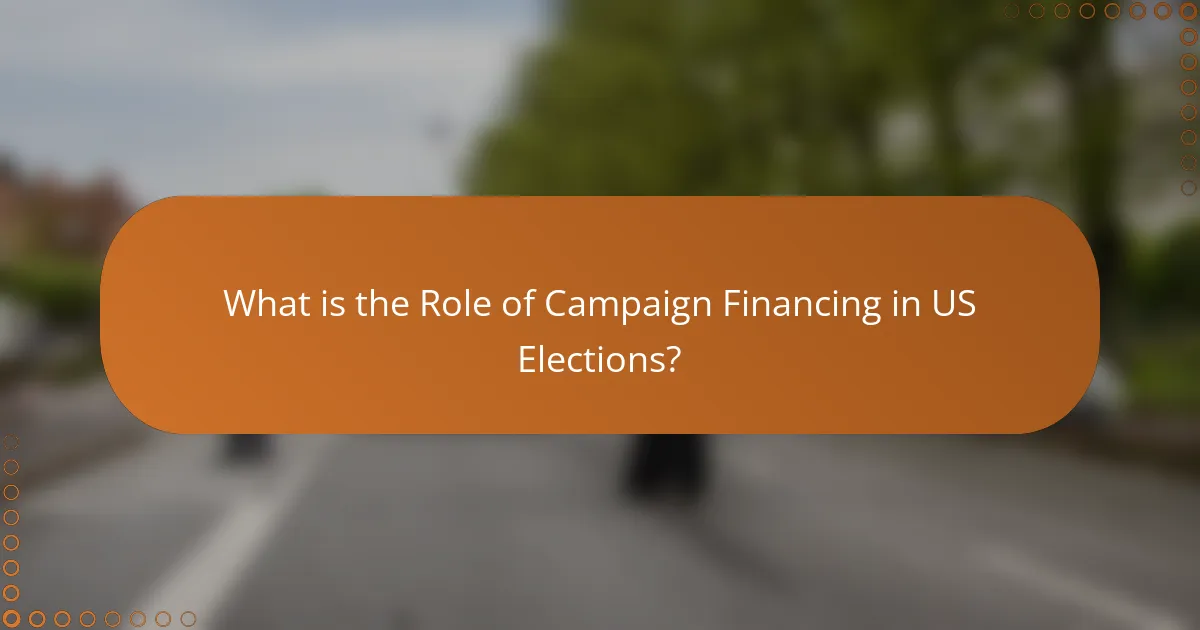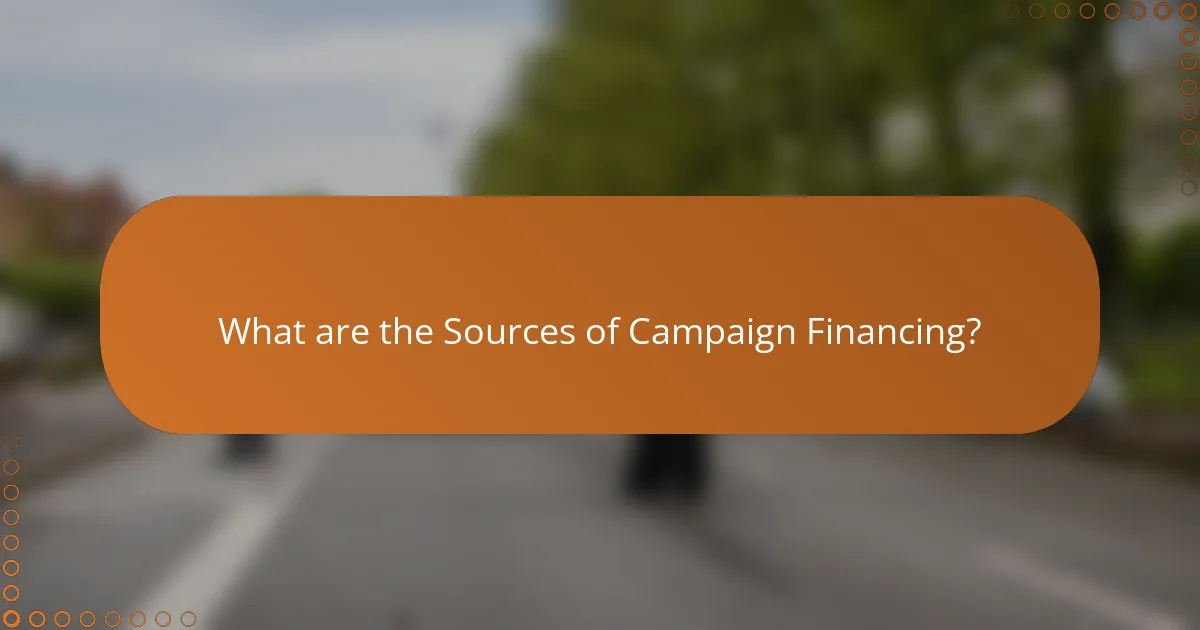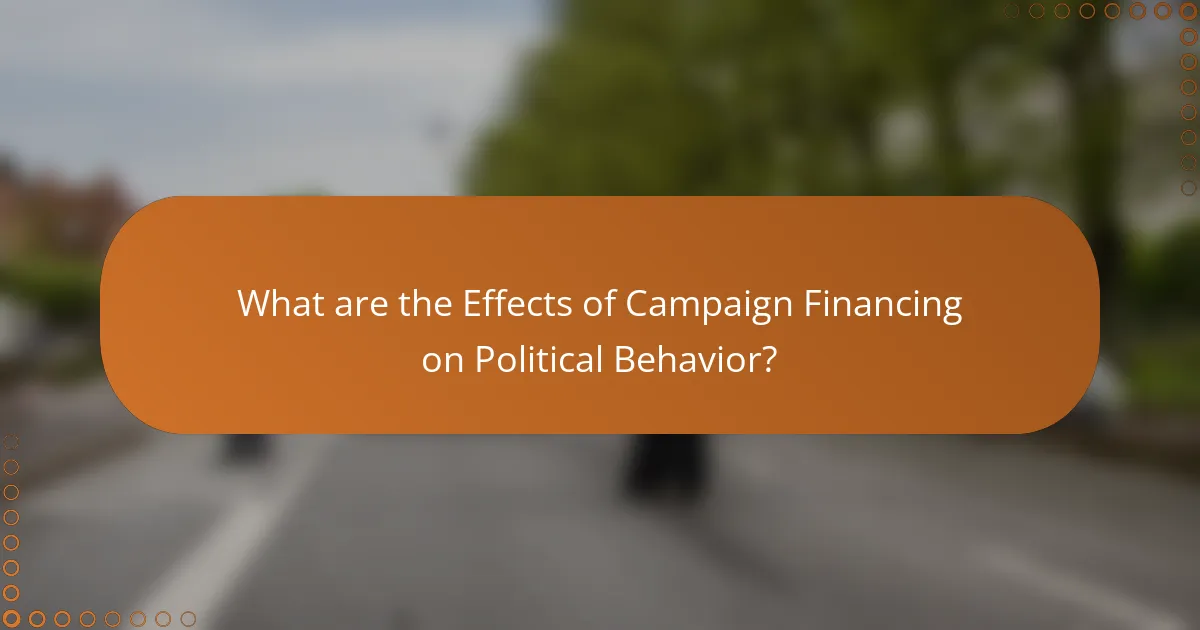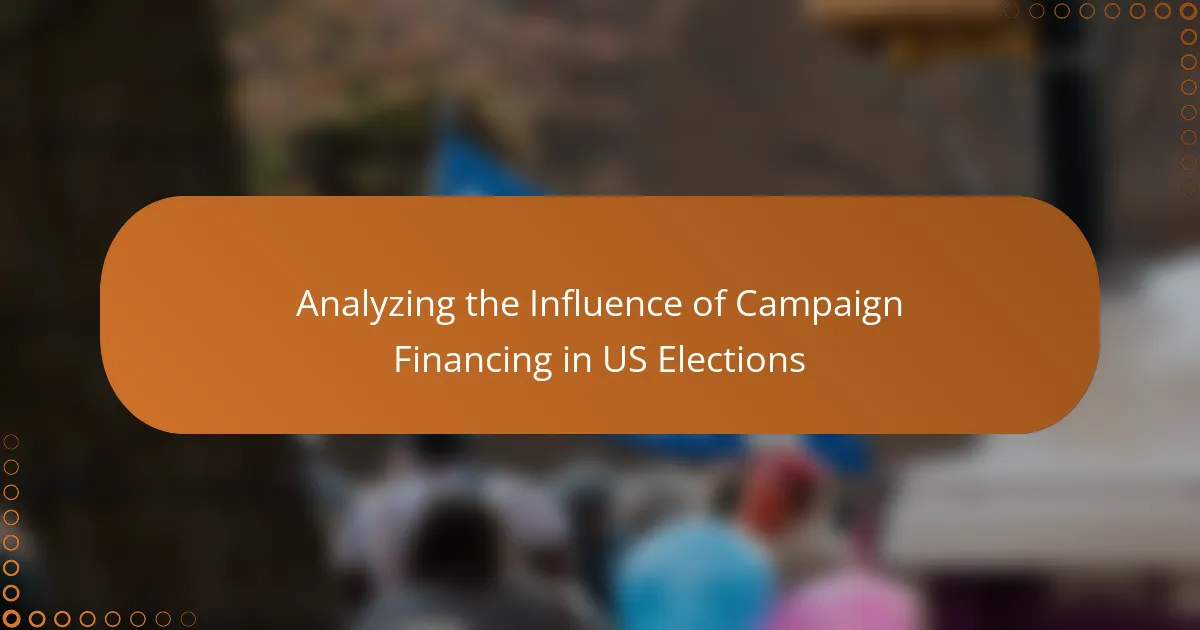Campaign financing is a fundamental aspect of US elections, enabling candidates to fund their campaigns through various sources such as individual contributions, political action committees (PACs), and party organizations. In the 2020 elections, candidates raised over $14 billion, highlighting the significant impact that financial resources have on voter perception and election outcomes. The Citizens United v. FEC ruling in 2010 further transformed campaign financing by allowing unlimited independent spending, leading to the emergence of Super PACs. This article analyzes how campaign financing influences political behavior, candidate viability, and policy prioritization, revealing the disparities it creates among different socioeconomic groups and its overall effect on the electoral landscape.

What is the Role of Campaign Financing in US Elections?
Campaign financing plays a crucial role in US elections by enabling candidates to fund their campaigns. It allows candidates to cover expenses such as advertising, staffing, and outreach efforts. According to the Federal Election Commission, candidates in the 2020 elections raised over $14 billion. This funding can significantly influence voter perception and election outcomes. Wealthy candidates or those with access to large donors can gain an advantage. Additionally, campaign financing shapes political agendas and priorities. The Citizens United v. FEC ruling in 2010 further expanded the role of money in politics. It allowed for unlimited independent spending by corporations and unions. This ruling has led to the rise of Super PACs, which can raise and spend unlimited amounts. Overall, campaign financing is integral to the electoral process in the United States.
How does campaign financing influence electoral outcomes?
Campaign financing significantly influences electoral outcomes by determining candidates’ visibility and messaging power. Higher campaign funds allow candidates to invest in advertising, outreach, and mobilization efforts. This increased visibility can lead to greater voter recognition and support. For instance, in the 2020 U.S. elections, candidates who raised more funds generally received more votes. Data from the Federal Election Commission shows that candidates who spent over $1 million won approximately 80% of their races. Furthermore, campaign financing can impact the types of issues prioritized during elections, as well-funded candidates can shape the narrative. Overall, the correlation between campaign spending and election success is well-documented in political science research.
What types of campaign financing exist in the US?
There are several types of campaign financing in the US. These include individual contributions, Political Action Committees (PACs), and party financing. Individual contributions are funds donated by private citizens to candidates. PACs collect contributions from members and donate to candidates or parties. Party financing refers to funds provided by political parties to support their candidates. Additionally, there are independent expenditures, which are funds spent by individuals or groups not affiliated with a candidate. According to the Federal Election Commission, these various financing types play a significant role in shaping election outcomes and candidate viability.
How do different financing methods impact candidate competitiveness?
Different financing methods significantly impact candidate competitiveness in elections. Candidates with access to larger funds can afford extensive advertising and outreach efforts. This often leads to greater visibility among voters, which can translate into higher poll numbers.
Public financing can level the playing field by providing equal resources to all candidates. However, candidates relying solely on small donations may struggle to compete against those with substantial backing. Research shows that candidates who utilize a mix of financing methods tend to perform better.
For example, a study by the Brennan Center for Justice indicates that candidates with higher fundraising totals are more likely to win their races. This correlation highlights the importance of financing methods in determining electoral outcomes.
Why is transparency in campaign financing important?
Transparency in campaign financing is important because it promotes accountability and trust in the electoral process. When voters can see who funds campaigns, they can better assess potential influences on candidates. This visibility helps prevent corruption and ensures that elected officials represent the interests of their constituents. According to a 2020 report by the Brennan Center for Justice, transparency in campaign financing can lead to increased public confidence in democracy. Additionally, research shows that transparent financing can deter unethical behavior among candidates. Overall, transparency serves as a safeguard for democratic integrity.
What regulations govern campaign financing in the US?
Campaign financing in the US is governed primarily by the Federal Election Commission (FEC) regulations and the Bipartisan Campaign Reform Act (BCRA) of 2002. The FEC enforces laws that regulate the contributions and expenditures of individuals and organizations in federal elections. The BCRA aimed to reduce the influence of money in politics by banning soft money contributions to national political parties and imposing stricter limits on individual contributions. Additionally, the Supreme Court’s decision in Citizens United v. FEC (2010) allowed corporations and unions to spend unlimited amounts on independent political expenditures. This ruling significantly impacted the landscape of campaign financing, leading to the rise of Super PACs, which can raise and spend unlimited funds. These regulations collectively shape the framework for campaign financing in the US, influencing how candidates fund their campaigns and the overall electoral process.
How do transparency measures affect public trust in elections?
Transparency measures increase public trust in elections by providing clear information about the electoral process. When voters can see how campaigns are funded and how votes are counted, they feel more confident in the integrity of the system. Research indicates that transparency reduces perceptions of corruption. A study by the Pew Research Center found that 66% of Americans believe transparency in campaign financing is essential for trust in elections. Furthermore, transparent processes allow for public scrutiny, which acts as a deterrent to malpractice. This openness fosters a sense of accountability among election officials and candidates. As a result, trust in the electoral system is strengthened when transparency measures are implemented effectively.

What are the Sources of Campaign Financing?
Sources of campaign financing include individual contributions, political action committees (PACs), and party organizations. Individual contributions are donations made by voters to support candidates. PACs collect funds from members to support specific political agendas. Party organizations provide financial resources to candidates aligned with their political platform. Additionally, corporations and unions can contribute through PACs. Public funding is another source, where candidates receive government funds based on certain criteria. According to the Federal Election Commission, individual contributions accounted for over 60% of campaign financing in recent elections. This data highlights the significant role that individuals play in funding campaigns.
Who are the primary contributors to campaign financing?
The primary contributors to campaign financing include individuals, political action committees (PACs), and corporations. Individuals can make direct contributions to candidates within legal limits. PACs collect funds from members to support candidates and influence elections. Corporations can contribute through PACs or independent expenditures. In the 2020 U.S. elections, individuals accounted for approximately 60% of total contributions. PACs contributed around 30%, while corporate contributions made up about 10%. This distribution shows the significant role of individual donors in campaign financing.
What role do individuals play in campaign contributions?
Individuals play a significant role in campaign contributions by providing financial support to candidates and political parties. This support can influence election outcomes and policy decisions. According to the Federal Election Commission, individuals contributed over $2 billion to federal candidates in the 2020 election cycle. Contributions from individuals can help candidates amplify their message and reach a broader audience. Furthermore, individual donations can signal grassroots support, which may attract additional funding from larger donors and organizations. The impact of individual contributions is crucial in shaping the political landscape and determining which candidates can compete effectively in elections.
How do Political Action Committees (PACs) influence financing?
Political Action Committees (PACs) influence financing by collecting and distributing funds to candidates. They pool contributions from members to support political campaigns. PACs can donate directly to candidates or engage in independent expenditures. This financial support can significantly impact a candidate’s ability to campaign effectively. According to the Federal Election Commission, PACs contributed over $1.5 billion in the 2020 election cycle. This funding often helps candidates amplify their messages and reach more voters. The presence of PACs can also shape campaign strategies and priorities, aligning them with the interests of their contributors.
How do corporate donations affect campaign financing?
Corporate donations significantly influence campaign financing by providing substantial financial resources to candidates. These donations can enhance a candidate’s visibility and outreach efforts. In the 2020 U.S. elections, corporate donations accounted for approximately 70% of total contributions to political action committees (PACs). This financial backing often leads to increased advertising and campaign activities. Candidates receiving corporate funds may also align their policies with corporate interests. Research indicates that corporate-funded candidates are more likely to prioritize business-friendly legislation. This dynamic can create an imbalance in political representation. Ultimately, corporate donations shape the electoral landscape by amplifying the voices of wealthy entities over individual voters.
What are the implications of Super PACs in elections?
Super PACs significantly influence elections by allowing unlimited contributions to support candidates. They can raise and spend vast sums of money, often surpassing traditional campaign financing limits. This creates an imbalance in political power, favoring wealthy donors and special interest groups. Super PACs often engage in extensive advertising campaigns, which can sway public opinion. According to the Center for Responsive Politics, Super PACs spent over $1 billion in the 2020 election cycle alone. Their ability to operate independently of candidates enables them to shape electoral narratives without direct candidate involvement. This raises concerns about transparency and accountability in campaign financing. Overall, Super PACs have transformed the electoral landscape, amplifying the influence of money in politics.
How do lobbying efforts correlate with campaign financing?
Lobbying efforts significantly correlate with campaign financing. Lobbyists often provide financial support to candidates who align with their interests. This financial backing can influence candidates’ positions and legislative actions. For instance, a study by the Center for Responsive Politics found that in 2020, the pharmaceutical industry spent over $300 million on lobbying. This expenditure often translates into substantial campaign contributions. Consequently, candidates receiving such contributions may prioritize the interests of these industries. The relationship between lobbying and campaign financing creates a cycle of influence that can shape policy outcomes.

What are the Effects of Campaign Financing on Political Behavior?
Campaign financing significantly influences political behavior. It affects candidate viability and voter perception. High funding levels can enhance a candidate’s visibility and outreach. This can lead to increased voter engagement and turnout. Research indicates that candidates with more financial resources often receive more media coverage. For instance, a study by the Center for Responsive Politics found that candidates who spent more than $1 million were more likely to win elections. Additionally, campaign financing can lead to policy prioritization based on donor interests. This can create a disparity in representation among different socioeconomic groups. Overall, the effects of campaign financing are profound and shape the political landscape.
How does campaign financing shape candidate priorities?
Campaign financing significantly shapes candidate priorities by influencing their policy focus and electoral strategies. Candidates often prioritize issues that align with the interests of their major donors. For example, research by the Center for Responsive Politics shows that candidates who receive substantial funding from specific industries tend to advocate for policies beneficial to those sectors. This creates a direct correlation between funding sources and legislative agendas. Additionally, candidates may shift their priorities to attract funding from influential donors. This dynamic can lead to a misalignment between elected officials’ actions and the interests of their constituents. Consequently, campaign financing plays a crucial role in determining which issues gain prominence in political discourse.
What influence does financing have on policy decisions?
Financing has a significant influence on policy decisions. Political contributions can shape the priorities of elected officials. Candidates often align their policies with the interests of their financial backers. This alignment can lead to legislation that favors specific industries or groups. Research indicates that higher campaign contributions correlate with favorable policy outcomes for donors. For example, a study by the Center for Responsive Politics found that industries contributing more to campaigns often receive beneficial regulations. Additionally, financing can create a dependency on donor support, influencing long-term policy commitments. Thus, the relationship between financing and policy decisions is both direct and impactful.
How does the need for funding affect candidate messaging?
The need for funding significantly influences candidate messaging. Candidates often tailor their messages to appeal to potential donors. This can lead to a focus on issues that resonate with wealthy contributors. For example, candidates may emphasize tax cuts or deregulation if these align with donor interests. Additionally, funding constraints can limit the scope of messaging. Candidates with less funding may focus on key issues rather than broad platforms. Historical data shows that candidates with higher funding can afford more comprehensive advertising campaigns. This allows them to communicate their messages more effectively to a wider audience. Ultimately, the need for funding shapes the priorities and strategies of candidates in their messaging.
What strategies do candidates use to secure financing?
Candidates use several strategies to secure financing for their campaigns. They often rely on fundraising events to gather contributions from supporters. Direct outreach to potential donors is another common approach. Candidates may also utilize online crowdfunding platforms to reach a broader audience. Building a strong network of supporters can lead to increased financial backing. Furthermore, candidates frequently engage with political action committees (PACs) for additional funding sources. They may also seek endorsements from influential figures to attract more donations. According to the Federal Election Commission, candidates raised over $1.5 billion for the 2020 election cycle, highlighting the importance of these financing strategies.
How do candidates engage with donors and supporters?
Candidates engage with donors and supporters through various strategic methods. They often organize fundraising events to connect directly with potential contributors. These events can include dinners, galas, or online fundraisers. Candidates also utilize social media platforms to share their messages and solicit donations. Personalized communication, such as emails and phone calls, helps candidates establish relationships with supporters. They provide updates on campaign progress to keep donors informed and engaged. Transparency about how funds will be used can also strengthen trust. According to the Federal Election Commission, effective engagement can significantly impact fundraising success.
What practices can improve fundraising effectiveness?
Effective fundraising can be improved through targeted donor engagement strategies. Personalizing communication increases donor connection and retention. Utilizing data analytics helps identify potential high-value donors. Implementing tiered giving levels encourages larger contributions. Regularly updating donors on campaign progress fosters trust and loyalty. Organizing impactful events can enhance community involvement and support. Leveraging social media expands outreach and engagement opportunities. A clear, compelling narrative about the campaign’s mission attracts more supporters.
What best practices can candidates follow for ethical campaign financing?
Candidates can follow several best practices for ethical campaign financing. First, they should ensure transparency by fully disclosing all campaign contributions and expenditures. This builds trust with voters and complies with legal requirements. Second, candidates should set clear limits on the amount of money they accept from individual donors. This prevents undue influence from wealthy contributors. Third, they can establish a diverse funding base by seeking small donations from a large number of supporters. This approach promotes grassroots support and reduces reliance on a few major donors. Additionally, candidates should avoid accepting funds from sources that could compromise their integrity, such as corporations or special interest groups with conflicting agendas. Lastly, they should regularly review and adhere to federal and state regulations regarding campaign financing. This ensures compliance and reinforces their commitment to ethical practices.
The main entity of this article is campaign financing in US elections. The article analyzes the critical role campaign financing plays in shaping electoral outcomes, candidate competitiveness, and political behavior. It covers various types of financing, including individual contributions, Political Action Committees (PACs), and corporate donations, while discussing the implications of Super PACs and lobbying efforts. Additionally, the article emphasizes the importance of transparency in campaign financing and outlines best practices for ethical fundraising, providing a comprehensive overview of how financial resources influence political priorities and voter perceptions.
